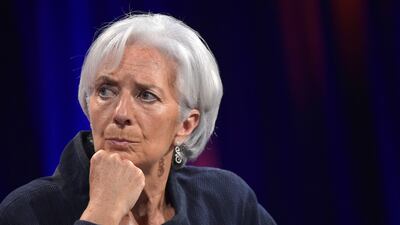More than two centuries ago, Adam Smith praised the virtues of “peace, easy taxes and a tolerable administration of justice” as components of statecraft. Christine Lagarde, the managing director of the IMF, quoted his words in a speech in Abu Dhabi on February 22. The virtues of peace and good administration of justice are plain, but what of these “easy taxes”?
If you want to go back to the source material, most of what Adam Smith had to say about taxation back in the 18th century is in Book V, Chapter II, Part II of Wealth of Nations.
Smith saw the essential requirements of a tax system as involving equity, or fairness; certainty, which includes simplicity; convenience; and economy, which in this context means efficiency, neutrality and effectiveness. In the parlance of Georgian England, those characteristics combined to make for “easy taxes”.
The reasons for the present discussion are obvious. Arabian Gulf economies depend on natural resources. Oil and gas are finite commodities with volatile prices. Price volatility, especially the likelihood of low prices for an extended period, plays havoc with budgets.
Prudent governments must plan ahead now for the post-oil economy when resources run low.
The results are now taking shape. As Obaid Humaid Al Tayer, the Minister of State for Financial Affairs, confirmed late last month that a GCC value-added tax framework agreement is likely to be concluded by June this year. Corporation tax is being considered.
Although Gulf oil and gas reserves will be around for a long time to come, that is no cause for complacency. The need has arisen for action to reduce spending and increase revenue by taking, as Ms Lagarde went on to say, “a unique opportunity to design tax systems that emphasise fairness, simplicity and efficiency”, Smith rules.
The GCC states have already taken steps to seize that opportunity, and recently the tempo has stepped up.
GCC finance ministers met in plenary session in April last year to work on the framework agreement, and met again with the governors of the region’s central banks in November last year. Many other high-level meetings will have taken place around those focal points.
Talk of tax provokes a predictable negative reaction. Few, if any, enjoy paying it. But that is a selfish approach.
“The ability of countries to generate robust government revenue is the lifeblood of modern states” as Ms Lagarde said in her speech in Abu Dhabi. “The policeman on the beat, the nurse who is attending to a patient, the teacher who is inspiring young minds, the scientist who is conducting cutting-edge basic research; these are some of the people who could not do their work without reliable government income.”
Public goods must be funded on a simple and fair basis. “Those who consume more should pay more” is a straightforward maxim that can be used. VAT, as a tax on consumption, is an easy means of doing so. Notably, the VAT proposed for the GCC will not be applied to consumer spending on public goods and food essentials.
The US president Calvin Coolidge (1923-29) once said: “Economy is the method by which we prepare today to afford the improvements of tomorrow.” His immediate successor, Herbert Hoover (1929-33), observed ironically: “Blessed are the young, for they shall inherit the national debt”.
In other words, good government should not only be concerned with the present, it should also have an eye to future sustainability and betterment.
In speaking of “intergenerational equity”, modern jargon loses the directness of those presidential statements, but the idea is the same. Fair use of resources and assets must have regard to the interests of future generations.
VAT, a tax on consumption of resources and assets, is a present-day levy that will provide for investment in the future.
Ms Lagarde’s prescription starts with the introduction of “a harmonised regional VAT”, advocates “greater emphasis” on corporate income tax, property tax and excises, and recommends continuing investment in building tax administration capacity: “strong fiscal institutions and public financial management are essential.” The GCC has already embarked on the first step (and the second step in part); the remainder is under active review.
Building administrative capacity is one element that is essential to effective implementation. It will be a challenge, but it must be done.
Other elements must also be brought into play. Coordination and cooperation between all interested stakeholders (governments, advisers, practitioners, academics, business leaders, media consultants and the general public) will be paramount.
As Mr Al Tayer noted: “A lot of groundwork needs to be done before implementing VAT. The private sector will need time to prepare for complying with tax rules. That is the reason we are giving enough time”.
It is reassuring to see governmental recognition of the scale of what needs to be done. If done well, stakeholders will be convinced of the merits of fair taxation, both for the present and for the future.
Michael Patchett-Joyce is a commercial lawyer and arbitrator based in London and the UAE. VAT has been a specialist part of his practice for more than 15 years.
business@thenational.ae
Follow The National's Business section on Twitter

